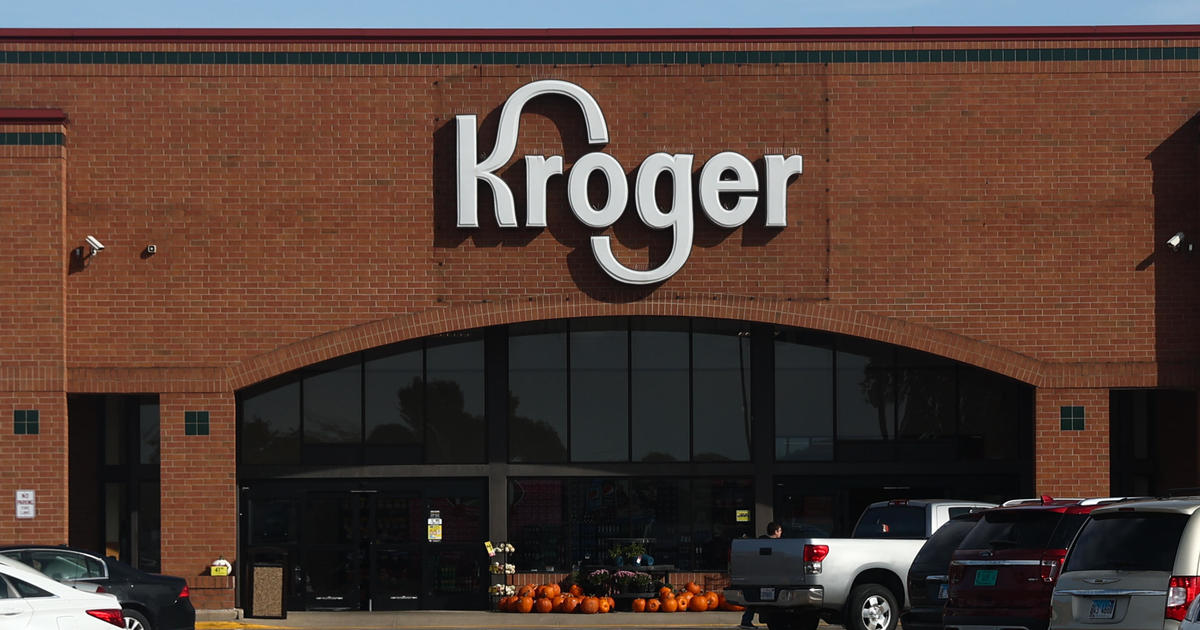The Federal Commerce Fee on Monday sued to dam a proposed merger between grocery giants Kroger and Albertsons, saying the $24.6 billion deal may end in larger costs for thousands and thousands of American customers.
The FTC filed a lawsuit in U.S. District Court docket in Oregon, alleging that the deal is anticompetitive and will hurt buyers by boosting costs for groceries and different important home items. The merger may additionally end in decrease high quality services, in addition to restrict buyers’ choices for the place to purchase groceries, the company alleged.
The FTC was joined within the swimsuit by eight state attorneys normal and the District of Columbia.
Kroger and Albertsons, two of the nation’s largest grocers, agreed to merge in October 2022. However grocery prices have soared for the reason that pandemic, pushing Individuals to spend extra of their revenue on meals than they’ve in 30 years and prompting some critics to level to company “greedflation” as a trigger.
Given excessive food-price inflation, the merger was certain to get powerful regulatory scrutiny.
“This grocery store mega merger comes as American customers have seen the price of groceries rise steadily over the previous few years,” stated Henry Liu, Director of the FTC’s Bureau of Competitors, in an announcement.
He added, “Kroger’s acquisition of Albertsons would result in further grocery worth hikes for on a regular basis items, additional exacerbating the monetary pressure customers throughout the nation face at present.”
U.S. costs for meals eaten at dwelling sometimes rise 2.5% per yr, however in 2022 they rose 11.4%, and in 2023 they rose one other 5%, in keeping with authorities information. Inflation is cooling, however progressively.
Larger rivals
The businesses stated a merger would assist them higher compete with Walmart, Amazon, Costco and different giant rivals. Collectively, Kroger and Albertsons would management round 13% of the U.S. grocery market; Walmart controls 22%, in keeping with J.P. Morgan analyst Ken Goldman.
Kroger, based mostly in Cincinnati, Ohio, operates 2,750 shops in 35 states and the District of Columbia, together with manufacturers like Ralphs, Smith’s and Harris Teeter. Albertsons, based mostly in Boise, Idaho, operates 2,273 shops in 34 states, together with manufacturers like Safeway, Jewel Osco and Shaw’s. Collectively the businesses make use of round 700,000 individuals.
The FTC, which stated the proposed deal could be the biggest grocery merger in U.S. historical past, stated it might additionally erase competitors for staff, threatening their means to win larger wages, higher advantages and improved working situations.
The Biden administration has additionally proven a willingness to problem large mergers in courtroom. Final month, the Justice Division sued to dam a proposed merger between JetBlue Airways and Spirit Airways.
The motion by the FTC and the states follows lawsuits filed earlier this yr in Colorado and Washington to dam the merger. The states that joined the FTC lawsuit Monday are Arizona, California, Illinois, Maryland, Nevada, New Mexico, Oregon and Wyoming.
Kroger’s pledge to decrease costs
Kroger has promised to take a position $500 million to decrease costs as quickly because the deal closes. It stated it additionally invested in worth reductions when it merged with Harris Teeter in 2014 and Roundy’s in 2016. Kroger additionally promised to take a position $1.3 billion in retailer enhancements at Albertsons as a part of the deal.
Final yr, C&S Wholesale Grocers agreed to buy 413 shops and eight distribution facilities that Kroger and Albertsons agreed to divest in markets the place the 2 firms’ shops overlapped. C&S stated it might honor all collective bargaining agreements with staff.
Nonetheless, the United Meals and Industrial Staff union, which represents 835,000 grocery staff within the U.S. and Canada, voted final yr to oppose the merger, saying Kroger and Albertsons had didn’t be clear in regards to the potential influence it might have on staff.
The union was additionally important of a $4 billion payout to Albertsons shareholders that was introduced as a part of the merger deal. A number of states, together with Washington and California, tried unsuccessfully to dam the cost in courtroom, saying it might weaken Albertsons financially.
Kroger and Albertsons had hoped to shut the deal early this yr. However the two firms introduced in January that it was extra more likely to shut within the first half of Kroger’s fiscal yr. Kroger’s fiscal second quarter ends August 17.
